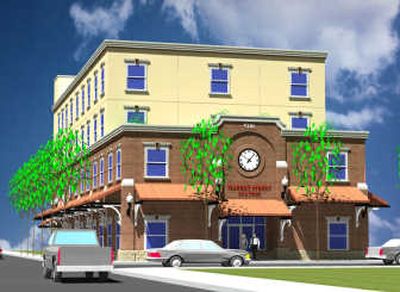Projects help fill affordable housing needs

Three projects poised to break ground will add 57 affordable apartments in Spokane, a city struggling to provide suitable homes for its neediest residents.
The new units are the net gain of three projects that will add or renovate as many as 116 units for low-income people in the West Central, Hillyard and downtown neighborhoods. The Spokane City Council on Monday approved devoting federal HOME funds to support all three projects, joining a mix of federal, state and local money.
“This is a fairly substantial number of projects to come forward,” said Mike Adolfae, the city’s community development director. “It really takes a long time to get stuff to this level.”
Two of the projects, Walnut Corners in West Central and Market Street Station in Hillyard, are new construction and total 80 units. However, 23 units of low-income housing will be demolished to make way for 47 new apartments in West Central.
Market Street Station is the complete makeover and expansion of a former bank building into a four-story, 33-unit building for low-income people age 55 or older.
The third project is the renovation of the 36-unit Bel Franklin apartments at 225 N. Division St., downtown.
Residents evicted due to the demolition or renovation of existing low-income units are being helped with relocation costs and will have first shot at the new units when they’re ready, housing agency representatives said. Officials with all three projects anticipate construction will take about a year.
As is the norm, the projects piece together funding from several sources, predominantly federal low-income housing tax credits. Additional money comes from the state’s Housing Trust Fund, city and county programs, and federal HOME funds, a federal block grant to state and local governments designed to create affordable housing for low-income households.
Market Street Station
“I just wish we could do these projects quicker than a two- to three-year timeline,” said Darryl Reber, executive director of Inland Empire Residential Resources, which is doing the $4.7 million Market Street Station project. Inland Empire has been around since 1990 and mostly develops homes for people with developmental disabilities, Reber said. This is the agency’s first foray into multifamily housing for low-income, older adults. Reber said his agency noticed a void in projects that serve people ages 55 to 62.
“We’ve been looking at serving other populations for quite some time as an organization,” he said.
Market Street Station will be next door to Spokane Elder Services, which Reber said should provide residents with assistance. Seven units will be designated for residents with disabilities.
All of the studio and one-bedroom apartments will be targeted toward people earning up to 60 percent of the area’s median income. For a single person, the area’s median income is $40,300.
The building will have a third-floor open patio, laundry facilities on two floors, library, sitting room and community space with a full kitchen. Construction is slated to start this fall and be finished in a year, Reber said.
Walnut Corners
Walnut Corners was created by four Spokane Lutheran churches wanting to help address the affordable housing crisis, said James Kashork, president of Spokane Urban Ministries.
The organization was formed from Grace, Emmanuel, St. Paul and Salem Lutheran churches along with Salem Arms, a nonprofit housing agency.
“The timing just kind of came together,” Kashork said. “We don’t want this to be our only project. We’re excited about this project as a model for churches in this community to do something about the housing crisis.”
The $9 million project will comprise two buildings – a three-story building on the southeast corner of Walnut Street and Broadway and a U-shaped structure stretching from Walnut to Cedar Street on Mallon Avenue, just north of Salem Lutheran Church. The project will include a courtyard, play area and street-level commercial office space for lease.
The units will be designated to serve people at different income levels, with some of them serving the city’s poorest – those making 30 percent of the median income or less. Eighteen units will house residents with chronic mental illness.
Walnut Corners expects to break ground in August with people moving in next summer.
Bel Franklin
Rehabilitation of the Bel Franklin apartments is expected to start in July, with units ready for leasing in April 2009. Spokane Housing Ventures bought the top three floors of the building, which contain 36 apartments.
“We are doing what we consider a gut rehab,” said Helen Stevenson, manager of acquisitions and development for the nonprofit housing agency. That renovation will include new electrical, heating, plumbing and fire suppression systems, along with a new elevator, roof, insulation and construction of a rooftop deck.
“We are looking forward to offering those units back” to the people who were relocated for the renovation, Stevenson said. “They will have first right of refusal for the new units.”
Half of the units will be targeted to those making 30 percent of the area’s median income or less. The others will be designated at various income levels, stretching up to 60 percent of that sum.
“We’re not replacing the 250 units that have been lost in the last year and a half, but it will make a tiny little dent,” Stevenson said, referring to the number of people who recently have been displaced due to redevelopment or foreclosure of affordable housing buildings in Spokane.
The $5.8 million Bel Franklin project is funded primarily by $4.3 million from the low-income tax credits program, which Stevenson said has tightened with financial markets.
She commended lenders at Wells Fargo for being willing to purchase those credits despite the instability in the market.
Stevenson said 12 people are on a waiting list for the Bel Franklin units. Others who are interested should call her at (509) 232-0170, ext. 208.
In addition, she said, downtown property owners who have buildings they want to sell should contact one of the nonprofit housing agencies “because we’re always interested in buying.”